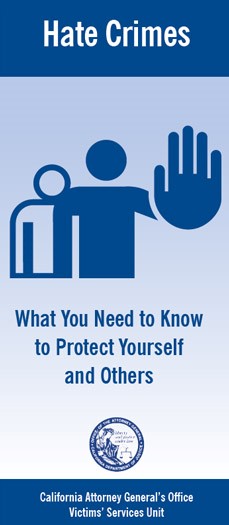The Attorney General has developed a brochure with information on how to identify and report hate crimes and the services available to victims of hate crimes.
State of California Department of Justice - Hate Crimes
The hate crimes brochure is available in fourteen languages:
English, Spanish, Arabic, Armenian(Eastern), Cambodian, Chinese (Traditional), Hindi, Hmong, Japanese, Korean, Punjabi, Russian, Tagalog, Vietnamese.
The brochures can be downloaded, printed and shared online.

UCLA Police Department
Email: info@ucpd.ucla.edu
Phone: (310) 825-1491
Fax: (310) 206-2550
Mail Code: 136408
Address
601 Westwood Plaza
Los Angeles, CA 90095-1364
Business Hours
Monday – Friday 8 a. m. to 5 p. m.
Station Hours
24 hours a day, 7 days a week



